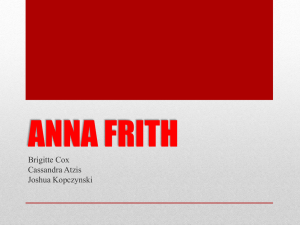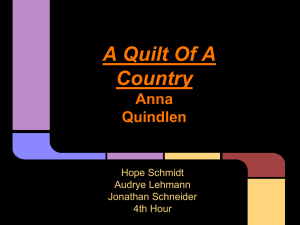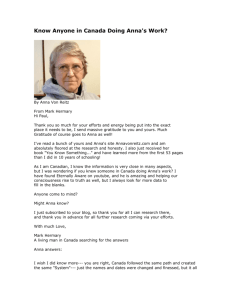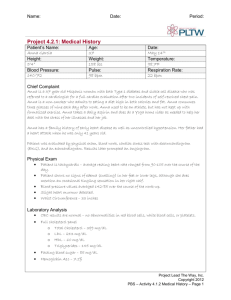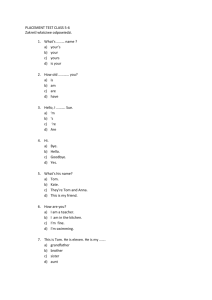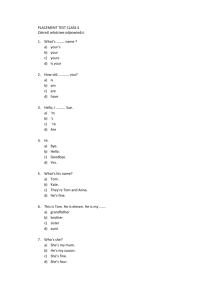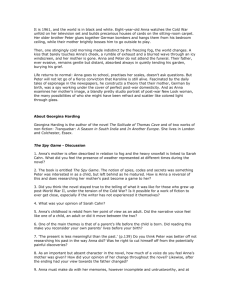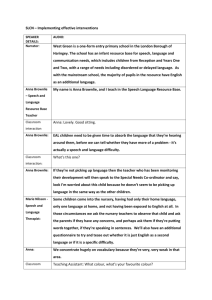The Winston`s Wish programme, SWITCH, is a therapeutic support
advertisement
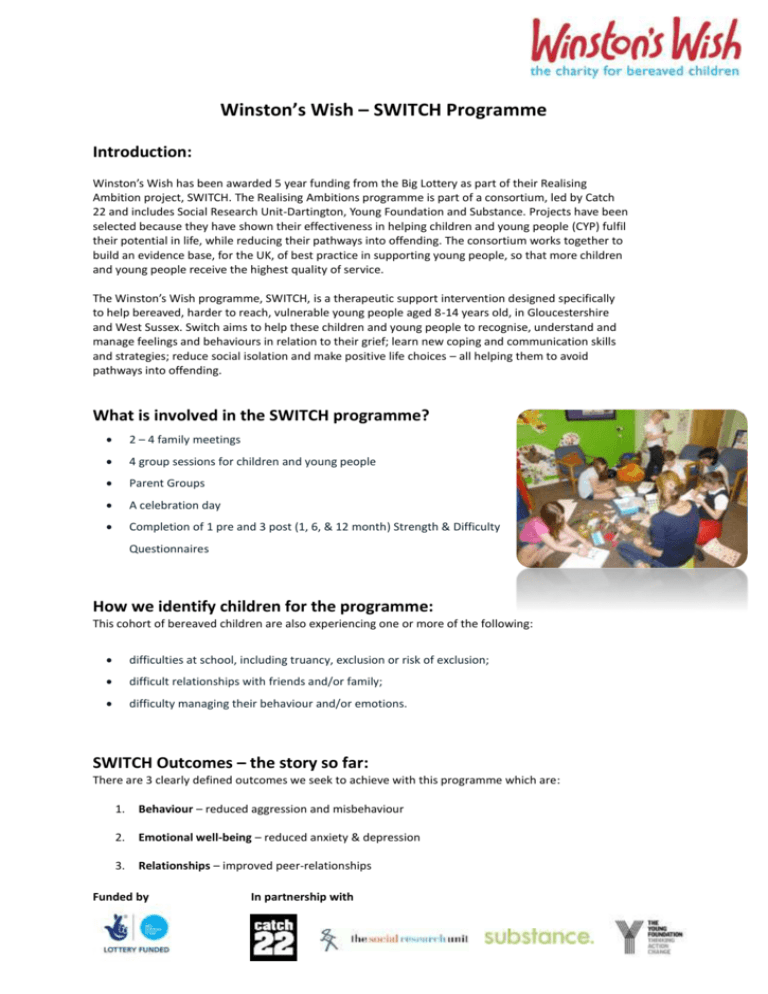
Winston’s Wish – SWITCH Programme Introduction: Winston’s Wish has been awarded 5 year funding from the Big Lottery as part of their Realising Ambition project, SWITCH. The Realising Ambitions programme is part of a consortium, led by Catch 22 and includes Social Research Unit-Dartington, Young Foundation and Substance. Projects have been selected because they have shown their effectiveness in helping children and young people (CYP) fulfil their potential in life, while reducing their pathways into offending. The consortium works together to build an evidence base, for the UK, of best practice in supporting young people, so that more children and young people receive the highest quality of service. The Winston’s Wish programme, SWITCH, is a therapeutic support intervention designed specifically to help bereaved, harder to reach, vulnerable young people aged 8-14 years old, in Gloucestershire and West Sussex. Switch aims to help these children and young people to recognise, understand and manage feelings and behaviours in relation to their grief; learn new coping and communication skills and strategies; reduce social isolation and make positive life choices – all helping them to avoid pathways into offending. What is involved in the SWITCH programme? 2 – 4 family meetings 4 group sessions for children and young people Parent Groups A celebration day Completion of 1 pre and 3 post (1, 6, & 12 month) Strength & Difficulty Questionnaires How we identify children for the programme: This cohort of bereaved children are also experiencing one or more of the following: difficulties at school, including truancy, exclusion or risk of exclusion; difficult relationships with friends and/or family; difficulty managing their behaviour and/or emotions. SWITCH Outcomes – the story so far: There are 3 clearly defined outcomes we seek to achieve with this programme which are: 1. Behaviour – reduced aggression and misbehaviour 2. Emotional well-being – reduced anxiety & depression 3. Relationships – improved peer-relationships Funded by In partnership with These outcomes, if improved, have been shown to be associated with likely subsequent reductions in involvement with the criminal justice system – the ultimate aim of the Realising Ambition programme. Positive improvements in the following areas, which are indicators that are used to determine if CYP are moving toward being better able to cope with their emotions and control their negative thinking: Early indicator impact scores suggest a 62% overall improved impact score across each of our 3 outcomes: Behaviour - reduced aggression and misbehaviour o Children show reduction in disobedient, aggressive and defiant behaviours Emotional well-being – reduced anxiety and depression o Children display improvements across a range of physical and emotional symptoms Relationships – improved peer relationships o Children show improved relationships with their peers Anna’s journey: Anna before the intervention: Anna was being supported by the Parent Support Advisor at her primary school because she was presenting with emotional and behavioural difficulties that were impacting on her ability to make and maintain friendships. These difficulties were impacting on Anna’s learning and her general self-esteem. Anna said that she had found it difficult not getting angry, especially with her friends. She described some of her previous behaviours, which included some that were physically aggressive and she had exhibited when she was younger. Anna expressed concern that she did not want her anger to get out of control again. During a family meeting session Anna said, “I am worrying about getting angry with other people”. Mum’s feedback 6 months post intervention: “There have been some significant changes in terms of Anna’s mood and general behaviour. Her aggression has reduced and [I feel we] are getting on better.” Referrer feedback 6 months post intervention: “The impact on the child I referred has been huge. She is generally much happier in all areas of her life. She is now able to speak to her mother about how she is feeling without worrying that she will upset her. She is now able to manage her feelings around the death of her family members. Whilst she still feels sad at times, those feelings no longer override all aspects of her life. Anna has strategies to manage her feelings and positive ways to remember the family members. As a result her behaviour and reactions to others were greatly improved, thus friendship conflicts and issues have reduced. She is now able to concentrate and engage fully with her learning. She is able to empathise with others and impart skills she has learnt. She no longer experiences headaches and stomach aches that require her to go home”. Funded by In partnership with
